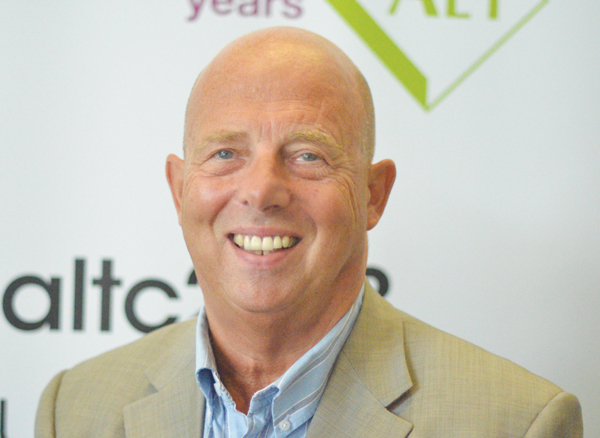Teachers are struggling to deliver the computing curriculum, says the chief of the professional body chosen by the government to leads its reforms.
Dr Bill Mitchell, head of the British Computing Society (BCS), says that it could be another five years before teachers feel confident enough to successfully teach computing science.
The comments come after figures revealed the government has recruited only 70 per cent of computer science teachers for the coming academic year.
Dr Mitchell, speaking to delegates at a Westminster Education Forum last month, said while teachers were no longer “drowning”, they were still struggling to keep their head above water.
“Many can see that there might be a boat and they are trying to swim towards it. They get help some of the time, but we need them to get a lot more help.”
But getting that help into schools – led largely by the BCS and its Computing at School (CAS) organisation – is problematic.
Schools are not releasing teachers to attend training, says Phil Spencer, course leader for PGCE ICT and computing at Sheffield Hallam University, which provides training in CAS’ Network of Excellence.
“I’m delivering CPD to the same people over and over again . . . the people willing to give up their time to come into the university.
“If we are to get this subject off the ground . . . we need the funding to release teachers.”
Dr Mitchell said BCS used to offer cash incentives for schools to release teachers from the classroom but the money was no longer available.
So where does this leave the estimated 14,000 teachers delivering ICT GCSEs or A-levels, which will be scrapped from September next year?
Kay Simons, faculty leader for ICT and computing at Caroline Chisholm School in Northamptonshire, said: “The Department for Education (DfE) seems to think ICT teachers can just pick up teaching computing science. But it’s not like that. The subjects are totally different and schools aren’t giving us the time to train.”
She said one of the big hurdles was teaching programming, “I’m learning as I go along with the kids.”
Dr Mitchell was confident ICT teachers could make the transition but the standard and depth of content in the computing science A-level had “risen hugely”. He said to “really teach that well” teachers needed to have “degree level knowledge. That’s going to be hard.”

Bob Harrison, a member of advisory group UK Forum for Computing Education (UKForCE), said there had been a “naïve assumption and unrealistic expectation” by ministers that ICT teachers could make the transition to computing.
Drew Buddie, chair of the National Association for Technology in Education (Naace), said teachers were not told degree-level knowledge was required: “New teachers have been let down.”
The DfE said it was down to schools to ensure teachers were sufficiently trained. They had been given more than £4.5 million over the past three years, which had resulted in more than 15,000 hours of training for teachers.
“The BCS and CAS, as well as industry partners, have led the way in promoting new, cutting edge practice in schools and the department will continue to work with stakeholders across the computer industry to ensure teachers have the support they need to deliver these courses.”


Let’s face it, the DfE will never admit that it has ever made a mistake. When it says there have been 15,000 hours of training for teachers that averages out at less than one hour per school over all England’s schools. Just about enough time for the trainer to say “good morning everyone”.
So we will have thousands of ICT teachers who will not be able to teach Computer Science, and at the same time they will not be allowed to teach GCSE or A Level ICT, a subject which is several times more popular with students than Computer Science.
You could not make this up!
But then the DfE thinks anyone can teach. No qualifications are required to be a teacher. So how hard can it be to teach Computer Science? You only need degree level Computing to teach it so obviously anyone can teach it.
As for the BCS. These are the nerds who advise the DfE. Of course they believe everyone loves Computer Science and it is easy to pick up.
I have an idea. Why doesn’t the DfE start doing some genuine consultation for a change and ask for feedback from working teachers before they embark on yet more ideas based on feedback from a few SPADs.
One things is for sure at the end of all this. It will be the teachers’ fault that they cannot teach Computer Science because the government did its bit by putting in a whole £1.5 million per year for 3 years for training! Wow!
Given the slagging off the profession has had for 5 years, and the low pay, anyone who has degree level Computing is hardly likely to go and be a school teacher.
(A 3 year Computing degree needs about 5000 hours of study, so the government has provided enough training budget to train the equivalent of 3 teachers for 8,000,000 school students. Yes, that sounds like enough Nicky Morgan. Now let’s get all those Design and Technology teachers who will be redundant, teaching some French and Spanish because we have made MFL compulsory too.)
As an ICT consultant, STEM Ambassador and film maker I was very much behind the drive for curriculum change. I documented and disseminated the early CAS conferences and did loads of video interviews with good role model ICT teachers who had grasped the nettle and were then writing and contributing to new schemes of work/ lesson plans/ exciting activities for computing. Unfortunately there were very few of them.
The curriculum was hijacked by BCS on the grounds that ICT was merely “Office Skills” and this wasn’t helped by the fact that many practitioners did the least and bought and implemented the large company Cool Aid and little more – others were and are superb practitioners. The best ICT teachers always did use computing and ICT and applied it well but they were always in the minority. Then Google entered the frame and Gove bought into the whole BCS message – which isn’t a bad one, just that fewer people will be able to deliver computing at that level in schools as is being shown to be the case.
There should have been an ‘applied computing’ or some similar qualification as an intermediate/ alternative. We live in a golden age of resources – if you go to the CAS (http://www.computingatschool.org.uk/) site you will see a host of them on every part of the computing curriculum. There are numerous commercial schemes now available and thousands of online resources and people are not, apart from the enthusiasts, using them – why? Because it is difficult – because they feel swamped with no way in – that’s why. You have to have built up or been interested in building up subject specialist knowledge for years. Formal qualifications and courses are beginning to emerge and especially at KS1/2 there needs to be specialists in place. There are some amazing practitioners who are doing very worthwhile training at all levels but it’s not enough. You cannot clone them instantaneously – it does take years of hacking away in the classroom.
It seems to me that the government have put amazing resources and funding into this area only to fall at the last 20 yards and that is in the classroom with the classroom practitioner.
That is why I started up (with a few very experienced colleagues) Computing First (http://www.computingfirst.com). We are a small team who actually make our own kit and who design good solid curricular material based on years of classroom practice in computing with currently practising teachers. We are also working with teacher agencies to produce specialist computing teachers in schools because this is the only effective way to deliver, at volume, a change in this subject.
The government need to put specialists in schools at KS1/2. For many years I was one of that rare breed – a primary ICT teacher. I wasn’t the least bit in interested in management – what turned me on was the subject and yes, computing in the main. Of course I used computing and programming every day – how else could I have built up my expertise? Why do you think we have specialist Music teachers for the same reasons?
If you want this level of expertise in schools then you have to be willing to change how you manage and implement it. The old ways will not do.
It is, in fact, http://www.computingfirst.co.uk – 🙂
I am a secondary teacher (with a BSc in Computing!!) and have been a primary ICT teacher, alongside this, this year. My contract is not being renewed as ICT (they are calling it up here – no, sorry, digital literacy) is being taught by untrained primary teachers. They have loved the fact I have been teaching their kids things they would have been unable to do themselves. i am seriously considering giving up teaching.